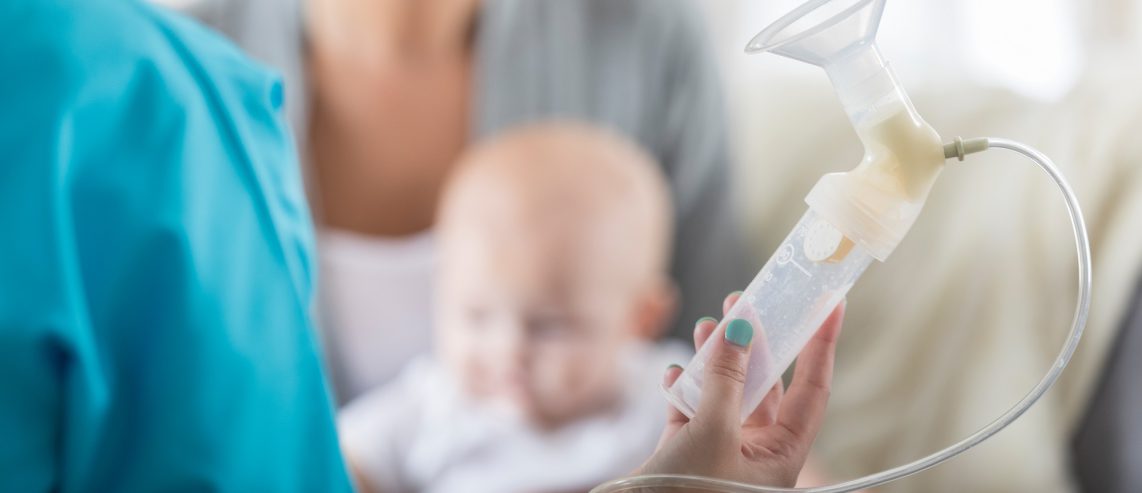Human breast milk is crucial for a baby’s nutrition during the first year of their life. It contains vital nutrients and stem cells for a baby’s growth and development, as well as antibodies to help them fight off infection.
But not all mothers can supply their own breast milk or enough of it to help their babies. That makes breast milk donation especially important.
New mothers who donate breast milk can help babies who aren’t receiving enough breast milk. During the COVID-19 pandemic, breast milk donations have dropped.
“Breast milk benefits are undeniable for all babies and can be lifesaving for high-risk infants, including those with neonatal opioid withdrawal syndrome,” says Gysella Muniz, MD, regional director, Quality Newborn Care, UPMC, and director, Newborn Nursery Services, UPMC Magee-Womens Hospital.
What Is Breast Milk Donation?
Breast milk donation is the process whereby new mothers can donate breast milk in a process managed by medical providers.
All donors go through a screening process to ensure they are healthy enough to donate. Their milk then goes to a hospital or milk bank, where newborns in need receive it.
“When you’re trying to be in the NICU and take care of your baby, eat, and pump every three hours, you have this stash of milk that’s supposed to be for your baby,” says Annette Kubalek.
Annette’s baby, Owen, died after contracting necrotizing enterocolitis (NEC) in July 2018. She ended up donating her breast milk.
“When faced with the worst, you start to think, ‘Well, I can’t flush this down the sink, but what am I going to do with it?’” Annette says. “So, to find a way to donate my breast milk was quite a relief. Just to know that it could be used and that a baby who needed it was going to get it.”
Never Miss a Beat!
Subscribe to Our HealthBeat Newsletter!
Thank you for subscribing!
You can now select the specific newsletters you'd like to receive.
You are already subscribed.
Subscribe to more newsletters in our email preference center.
Sorry, an error occurred. Please try again later.
Get Healthy Tips Sent to Your Phone!
How Can Donor Breast Milk Help Babies?
Jessica Rhodes has three children. Two of them needed donor breast milk after birth.
“After we had gotten the donor breast milk and moved forward a few months, you started to see Jackson come alive,” Jessica says. “I mean, our therapists that would come to the home [would] say it, our nurses would say it. And they were just in awe of where we started to where we came to on donor breast milk, not only just developmentally but even with his breathing.”
Breast milk provides newborns with important nutrients and supports growth and development. For babies with opioid withdrawal symptoms, the antibodies in breast milk provide better feeding tolerance and weight gain.
Breast milk also can protect babies from certain health conditions.
Newborns can be at risk for developing necrotizing enterocolitis (NEC). NEC is a life-altering or life-threatening bacterial infection of the intestines.
But if newborns receive human breast milk:
- They have a lower incidence and severity of NEC.
- It could prevent 1 in 10 cases of NEC.
- It could prevent 1 in 8 cases of NEC that require surgery or result in death.
“Human milk is one of the few things we provide babies in the NICU that is all benefit and no harm,” says Greg Barretto, MD, regional medical director, Division of Newborn Medicine, UPMC Children’s Hospital of Pittsburgh. “Babies who receive human milk are less likely to die, have an infection, develop necrotizing NEC, or have neurodevelopmental disabilities. It is highly recommended that pasteurized donor milk be used if the mothers’ own milk is not available.”
Where Can I Donate Breast Milk?
To donate breast milk, check out the Mid-Atlantic Mothers’ Milk Bank. There are several drop-off locations, as well as the option to ship if you do not live nearby. The screening and shipping costs are paid by the milk bank, so there is no cost to the donor.
Why Breast Milk Donation Accessibility Is Important
Breast milk donations have declined during the COVID-19 pandemic, while demand remains high. This is causing a need for breast milk donations across the U.S.
UPMC encourages mothers who are willing and able to donate their breast milk. It can help support babies in need.
Donor breast milk accessibility continues to be an important issue for several reasons, including:
- Lack of education and awareness around breast milk and milk donation.
- Financial barriers that make acquiring donor milk difficult.
- Insurance coverage for donated breast milk.
Breast milk is also essential for outpatient newborns. They are a population with complex medical needs. The use of pasteurized donor human milk (PDHM) can prevent readmissions, help avoid invasive medical procedures, and assist children in achieving growth and developmental targets. Without coverage, donor breast milk is almost unobtainable for most of these families.
At UPMC, we dedicate ourselves to ensuring newborns are getting the quality care they need. This includes proper access to donor breast milk both inside and outside of the hospital.
“By (UPMC) having access to a donor breast milk program, along with other quality improvement initiatives, we have been able to help mothers provide the very best nutrition for exposed babies, regardless of socioeconomic status,” Dr. Muniz says. “We understand the value and lifesaving properties of breast milk and do not believe access should be limited to only those who can afford it.”
Government Support for Access to Breast Milk Donation
While many health care organizations encourage mothers to donate breast milk, policy plays an important role in ensuring that those who need it most are able to affordably access it.
To address this problem, Pennsylvania legislation was recently signed into law, requiring Medicaid coverage for prescribed PDHM to be given to at-risk inpatient and outpatient infants.
UPMC and UPMC Magee-Womens Hospital are proud to have supported this effort and strongly believe it will ensure immediate and comprehensive access to donor milk for medically fragile babies across Pennsylvania.
Editor's Note: This article was originally published on , and was last reviewed on .
About Government Advocacy
UPMC is a world-renowned health care provider and insurer headquartered in Pittsburgh, Pennsylvania. Learn about UPMC’s position on public health issues and gain a better understanding of the initiatives that advance the health care industry.

